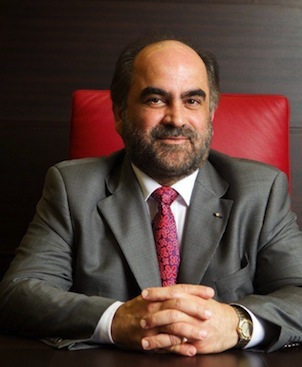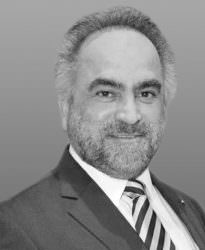This blog post was written by Mr. Abdulrahman A. Hussain Jawahery President of the Gulf Petrochemical Industries Co (GPIC) and Vice-President for Sustainable Development for the International Fertilizer Industry Association (IFA).
In the aftermath of Rio+20, and bearing the legacy of the Millennium Development Goals, the Sustainable Development Goals aim to generate a multidimensional approach for our global future. This new set of goals has the challenging mission to guide policy-makers, private industry, NGOs, national and regional governments in the measures they devise in the upcoming years; measures that are aimed at bringing about a healthier world, one in which wealth and resources are equitably distributed both between countries and within them, while environmental security and biodiversity are safeguarded.
Public engagement is unprecedented. The response to calls for submitting proposals, providing research and voicing concerns has been immense, aided by social media and modern communication platforms. All this commotion is an encouraging sign. A testament to the collective efforts which everyone – big and small, rich and poor – is making towards an overarching goal: a better and more sustainable future.
I believe that the new goals ought to be aspirational, ambitious, yet realistic. They should inspire all actors to find innovative ways of leading to their accomplishment, while allowing for the achievement of intermediary goals, which constitute check points along the steps to the top of the pyramid. Bearing this in mind, the Farming First coalition is working actively to make sure that agriculture remains at the top of the agenda and proposes two goals relating to agriculture and food security.
The first one is to eradicate hunger and malnutrition by 2025, because it can be done in our lifetime and because the realisation of this goal would have immense repercussions on most other goals aiming at overall economic development. Farmers and rural dwellers tend to make up the poorest fringes of the population worldwide, while at the same time producing the food we eat. By bringing farmers out of poverty we can achieve goals relating to gender equality, education, health, economic opportunities. The Farming First coalition and the fertilizer industry support the Zero Hunger Challenge, which advocates access to food all year round, eliminating stunted growth in children through improving the nutrient quality of food, sustainability across all food systems, increase in smallholder productivity and income and zero food waste or loss.
The second goal we propose is the adoption of sustainable agricultural practices, to plan for the agriculture of the future by raising agricultural productivity while protecting the environment. Countries and farmers will transition to more sustainable practices if their specific circumstances and needs are considered by policy-makers. Special attention should be given to women and to indigenous groups. The Farming First coalition and the fertilizer industry support the concept of sustainable intensification: producing more food per unit of land, while preserving or even enhancing soil quality, using less water and adopting integrated measures to reduce crop deterioration. The solutions will differ by region and by landscape to address the diversity of agricultural systems, farming practices and technologies, as well as benchmarks for balanced diets. In this context, such a transition to sustainable intensification cannot happen if we do not close the efficiency gap between farmers in the developing and the developed countries. Access to quality inputs and the knowledge to use them are essential to close this gap.

Gulf Petrochemicals Industries Co. employees are trained to provide them with skills, competencies and empowerment for their continuous improvement in health, safety and environmental best practices.
As a private sector representative, I can confidently state that returns on investment in sustainability are high and readily quantifiable. They translate into better resource allocation, a lower incidence of accidents and greater overall performance. My company, Gulf Petrochemicals Industries Co. (GPIC) has invested in its employees, its surrounding communities and its natural environment. Ever since becoming President of the company, I have been advocating tirelessly for the adoption of a culture of safety, health and environmental awareness. This is sustained by training our employees and providing them with skills, competencies and empowerment to continuously improve, as they are the key to the success in implanting HSE best practices. As a result, our production site now hosts; a fish farm where 100,000 sea bream fish are released into the deep sea annually to enrich marine life, a bird sanctuary which hosts over 30,000 birds with a record of 78 different species, and a number of gardens specifically made to plant rare indigenous, aromatic and desert plants to form a case study for educating school students on environmental natural presentation.

On-site gardens at Gulf Petrochemicals Industries Co., hosting rare indigenous, aromatic and desert plants to form a case study for educating school students on environmental natural presentation.

On-site fish farm at Gulf Petrochemicals Industries Co., hosting 100,000 sea bream fish that are released into the deep sea annually to enrich marine life.

On-site bird sanctuary at Gulf Petrochemicals Industries Co., hosting over 30,000 birds with a record of 78 different species.
We have worked extensively with UNEP to demonstrate that industrial development can be carried out in a manner that is respectful to both communities and the environment. In our commitment to mitigate climate change risks, we commissioned the first carbon dioxide recovery plant in the Middle East, in 2010. Our efforts at GPIC have not gone unnoticed. GPIC’s pioneer sustainable development program received recognition from the Royal Society for the Prevention of Accidents (RoSPA) UK, which awarded us the Sir George Earl Trophy. We are also one of only two organizations in the Arabian Gulf region to receive the accolade of the Robert Campbell Award from the US National Safety Council, for achievement in EHS. This not only honors us, it also motivates us to continue to strive to surpass our targets in sustainable development.
Both my professional experience and my personal commitment to sustainable development have strengthened my conviction that private sector involvement is imperative to improving the status quo. Therefore, in the words of UN Secretary General Ban-Ki Moon, I urge all leaders in the corporate world “to deliver value not just financially – but also in social, environmental and ethical terms.”
Let’s not be limited by challenges and difficulties, but be motivated by possibilities!
About the author:
Mr. Abdulrahman A. Hussain JAWAHERY is a Farming First spokesperson. He is President of the Gulf Petrochemical Industries Co (GPIC) and Vice-President for Sustainable Development for the International Fertilizer Industry Association (IFA). Mr. Jawahery is actively involved in the post-2015 and SDG process on behalf of the fertilizer industry. His company, GPIC, is a Methanol, Ammonia and a Nitrogen Fertilizer manufacturer company based in Bahrain with an annual production of 1.5 million tons of Petrochemical and Fertilizer products to supply the world’s farmers. Mr. Jawahery is a Chartered Chemical Engineer with a BSc and an MSc from the UK. An acclaimed environmental champion, he holds numerous positions within renowned scientific and environmental organizations throughout the UK, US and Bahrain.



